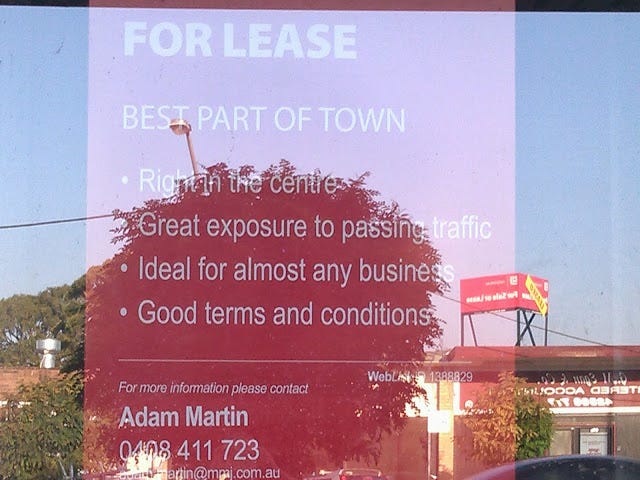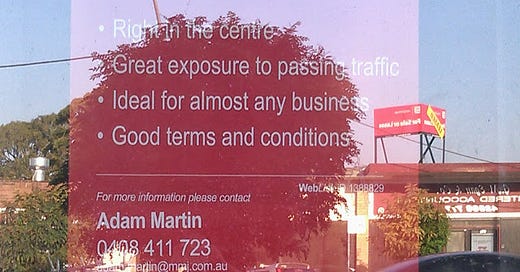
Empty shops, South Coast, NSW, Australia
All he could think of was the smug brutality of the political class; the stupidity of the GST. It was a disgusting, retrograde tax which had destroyed tens of thousands of businesses when it was introduced, and continued to act as a dead hand across the Australian economy. And all the money went to often corrupt, inept, utterly inefficient state governments, to squander on their endless stupid programs. We'd all be better off if they went out and shot themselves at dawn; or 90% of them just vanished into the ether. But that wasn't going to happen. They were just there, a deathly pall, and all the hopes and aspirations that people had were being trampled under prevailing, self-righteous ideologies. The road to hell was paved with good intentions. Puritans had won, and a strange astringency NOW ran through the culture.
And so he felt like shouting. But God forbid he should create noise "pollution". So he just wandered and squandered; and tried to recover from the worst piece of bullying he had ever endured; and his head ran around in circles and there wasn't much use denying he was now officially depressed. Flights on to hilltops and headlands, days and nights sitting in his car staring at the sea, tremendous, someone said, but there wasn't anything tremendous about it. "We had no idea..." We had no idea..." And so the canny circle went around. And he paid the price on top of the misery. And all was to be denied, because that's the way it was. He was going to get through to the other side. And nobody was going to like him for that either. And so, lonelier than he had ever been, he waited for the wheels to turn.
They were going to cripple themselves in their watching. They were going to make hay while the sun shone. But already the cold winds of winter were whipping across the bay, damp freeze settling around the bottom of hay stacks. Summer had decided not to come. So while self-interested politicians pounded on about extreme weather events, the rest of us wondered where the f... summer had gone. Because it was cold when it was meant to be hot. He could see their faces in the moonlight. He could remember every curve and forgot. He knew they knew where he was. Not even hiding his head under a blanket could erase them. Traumatised by the hunt, by the ridicule, by the fact the bastards just couldn't leave him alone, he had fled from one part of the country to another. And they always followed. They had done too good a job of their own propaganda; protecting their own little den of thieves. Exposing themselves. They could rot.
THE BIGGER STORY:
http://www.businessweek.com/articles/2013-12-04/can-thailand-break-its-coup-addiction
Can Thailand Break Its Coup Addiction?
By Joshua Kurlantzick December 04, 2013

Photograph by Vincent Thian/AP Photo
Anti-government protesters using a bulldozer to remove concrete barriers outside Bangkok police headquarters on Dec. 3
Over the past week, Thailand’s political unrest has descended into serious, chaotic violence. On Monday and Tuesday, protesters entered the grounds of both police headquarters and Government House, having already occupied other ministries. Last weekend at least three people were killed in clashes between anti-government protesters, pro-government supporters, police, and unidentified agitators. Dozens more were wounded, and parts of Bangkok near government ministries now look more like Syria-esque war zones than the streets of one of the most cosmopolitan capitals in Southeast Asia.
As protest leader Suthep Thaugsuban declares that there will be no surrender, demanding the prime minister step down and hand over power to an unelected “people’s council” of leaders, the chance of an extra-constitutional intervention— a military coup or an intervention by the royal palace—grows higher and higher. Already, the demonstrators have been able to take extraordinary steps that would have been unthinkable in most parliamentary democracies: occupying ministries, issuing deadlines to the government, taking over media outlets.
Prime Minister Yingluck Shinawatra’s government has responded weakly, allowing the demonstrators to just march into ministries, because government leaders know that if they take tough measures and many people are killed or wounded, the army—no fan of Yingluck or her populist party—would likely intervene. Indeed, Suthep already has declared that the armed forces are on the side of the protesters, who are primarily urban and middle class rather than the working class, rural supporters of Yingluck.
STORY: In Thailand, It's Crippling Déjà vu All Over Again
Thailand, in fact, is addicted to coups and other types of extra-constitutional interventions, which have badly undermined the country’s democracy. In most countries as wealthy as Thailand, coups have all but vanished since the end of the Cold War. Yet Thailand has witnessed 18 coups in the past seven decades, including one in 2006 against Yingluck’s brother, Thaksin Shinawatra, as well as other types of interventions. In 2008 and 2009, for example, after similar destructive protests by demonstrators paralyzed parts of Bangkok, leading pro-royalist elite politicians allegedly brokered backroom deals that led to the fall of a pro-Thaksin government and the installation of the opposition Democrat Party.
Why is Thailand so addicted to coups and other types of interventions? As Australian National University professor Nicholas Farrelly notes, decades of relying on coups as the default option to restore stability creates a kind of “coup culture,” in which the repeated use of coups leads elites to think they are the only way out of political stalemates. In other words, coups breed more coups.
Still, in some ways this argument is a tautology. Other countries also had such coup cultures—think of Turkey—and eventually broke the cycle to the point where coups became unacceptable. Thailand has not done so. That’s in part because, compared to nearly every army in the world, Thailand’s military is particularly bloated with senior officers who are not needed for defense and war-fighting. Despite having no obvious external enemies, Thailand has over 1,700 generals and admirals—proportionally a vastly higher percentage than in the U.S. military. Most of Thailand’s senior officers have no real jobs. Instead, they have come to believe they can gain prestige, work, and money only by intervening in politics.
STORY: Will the Generals Intervene Again in Thailand?
Thailand remains neither an absolute monarchy, like states in the Persian Gulf, nor a truly constitutional monarchy such as the Netherlands, Britain, or Japan. Although Thailand is technically a constitutional monarchy, the king, who is the longest-reigning monarch in the world, has over the decades amassed enormous personal powers to himself and his group of allies, often called the “network monarchy.” On some occasions, including in 1973 and 1992, the king intervened directly in politics to end street protests and arbitrate major disputes. In so doing, he may have helped Thailand in the short term while also weakening the power of formal institutions designed to handle disputes. Royal interventions may have added to the notion that Thailand’s political divides can only be handled informally, by a few good men from the palace or army.
Can the country, the second-largest economy in Southeast Asia and a critical hub for many multinationals, ever break its extra-constitutional habits? It’s possible: After a coup in 1992, Thailand seemed to be on the road to solid democracy and it could get back on track. Doing so is not impossible, as many Thai elites (and some Western analysts) insist, but it will require several groups of senior Thais to make compromises.



